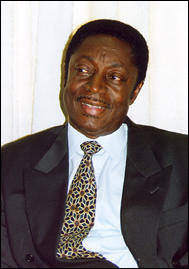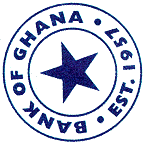
| 

| 
Interview with
Wg. Dr. Kwabena Duffuor,
Governor.
September 9th 1999
Contact :
P.O.Box 2674, Accra - GHANA
Tel: (233 21) 666 174-6 ; 666 902-8 ; 662 395
Fax: (233 21) 666 299 ; 666 417
E-mail: secretary@bog.gov.gh
|
Bank of Ghana is essentially a regulatory body, could you just explain to us briefly what its functions are?
Bank of Ghana is the central bank. Its main functions are:
To issue and redeem bank notes and coins.
To supervise the banking business in Ghana.
To promote and maintain the stability of the currency of Ghana and direct and regulate the currency system in the interest of the economic progress of Ghana.
To encourage and promote economic development and the efficient utilization of the resources of Ghana through effective and efficient operation of a banking and credit system in Ghana.
Could you tell us what in your view have been the high and low points of the Bank of Ghana?
We are responsible for the stability of the currency and I think we have been quite effective in monetary expansion. We have enjoyed some stability so one will say that the Central Bank has been very effective. However the use of cash in transactions is still high. This has been due to a number of reasons including low bank density, low patronage of banks and absence of legal safeguards for cheque transactions.
What measures are you putting in place to check these draw backs?
We have been working to bring banking to the doorsteps of the broadest sections of the society. This is being done by promoting entry into the industry and encouraging extension of bank branches to rural areas. The rural banking concept is also geared to promoting monetisation and financial intermediation in the rural areas.
The prevailing low patronage of banks is partly due to the denting of public confidence through past administrative actions. With the return to democratic and growing political stability, public confidence in the banking system is steadily building up.
We feel that there is need for legislation to regulate and safeguard the use of cheques in order to promote their acceptance for payments. We have been working to bring this objective to fruition. We have also been working to ensure a more efficient system which would also help to reduce the use of cash transactions.
We are encouraged by the intensified competition among the banks to mobilize deposits from the public, as this will help reduce the use of currency transactions. It is also encouraging that banks are introducing varied electronic means of savings and payments which will accelerate the shift from a cash-based economy
The cocoa and gold prices have seen a sharp fall whilst petrol prices have recently risen. What measures has the Bank of Ghana put in place to control this?
We are introducing measures which will reduce the gap. First some of these processes will have to be given to parliament for their approval so I am unable to disclose anything as yet.
What immediate implementations have you put in place to maintain a strong and stable currency?
We maintain a flexible exchange rate system whereby the exchange rate is determined by the forces of supply and demand. The Central Bank only enters the market to smoothen short-term fluctuations in the exchange rate due to non-economic factors. Furthermore, to the extent that a substantial portion of the country’s foreign exchange earnings is still surrendered to the Central Bank, the Bank deems it as its obligation to supply some of the foreign exchange needs of the economy from time to time when it is in a position to do so.
Although a stable currency is a desirable outcome, it is never the objective of the Central Bank to try and achieve this through interventions. Ultimately, a strong and stable currency can only be guaranteed by sound economic fundamentals. To this end, we have been pursuing policies geared to promoting a stable macroeconomic environment as a basis for sustainable growth.
How do you see the Ghanaian economy in the next couple of years?
The foundations for macroeconomic and financial stability are being laid. It is intended to increase our efforts to this end in order to create the necessary conditions for sustainable economic growth. In the short-term, the country will have to grapple with its susceptibility to the external shocks due to its historical over-dependence on primary-commodity exports.
| The long-term future of the Ghanaian economy, however, is bright. We envisage continued improvements in economic management and performance. We intend to create a stable, robust and diversified economy able not only to withstand internal and external shocks but also to guarantee a respectable standard of living for the people of this country.
Have you set up any particular monetary projects to try and encourage any priority sectors in the economy, especially in the non-traditional exports sector?
Yes, we want to ensure that we have a favorable macro-economic environment and to this end we try to encourage investments and I think we are doing well. Presently the key priority sectors in the economy are agriculture, exports and manufacturing. Agriculture remains the mainstay of the economy contributing about 35% of GDP and 60% of total employment. Productivity in the sector has remained low due to the continued reliance on weather conditions and the use of poor technology. Inadequate credit has also been a constraint. We prompt the banks to increase their credit facility to the sector to enhance productivity and production.
The exports sector has always been and will continue to be an important sector in the economy. Non-traditional exports particularly are important given the historical vulnerability of cocoa, gold and timber in the world markets. We encourage the banks to support the exports sector also. We , on our part, have continued to provide support by, among others, mobilizing external funds for the sector. The Private Enterprise Export Development (PEED) project which was administered but the Central Bank was such a project to make external funds available to eligible exporters.
The manufacturing sector is equally important in the economy. Unfortunately, manufacturing accounts for less than 10% of GDP and contributes similarly low proportion of exports. There is urgent need to increase manufacturing output especially by increasing the processing of primary products. It is only by adding value to our primary commodities that we can enhance their export value and reduce our vulnerability to the vicissitudes of primary commodity markets. Fortunately, the banks themselves recognize the importance of the manufacturing sector and continue to allocate a dominant proportion of their credit to the sector.
What is the role of the Bank of Ghana in meeting the challenges of Vision 2020?
The key objective of Vision 2020 is to move Ghana forward into the middle-income group of countries by 2020. The key elements of policy to this end include: accelerated growth of 8-10% per annum to shorten the poverty alleviation period; human-development centered strategy involving, inter alia, capacity building, income distribution and employment generation; enhancement of general economic management; and improvements in economic and social infrastructure.
We have been moving steadily towards the goals of Vision 2020 by promoting a stable, resilient and diversified economy. The economy, however, remains vulnerable to external shocks which put temporary impediments in our way. In the medium- to long-term, however, we hope to overcome these challenges and to be on course for Vision 2020.
On a more personal level what would you say has been your greatest achievement since you have been the Governor of the Bank of Ghana?
Economic environment under my governorship has changed. We have been able to create a stable economic environment. Inflation has gone low, budget expenses have been lowered, interest rates have been lowered, everything has been streamlined.
What would be your final message to the Forbes readers who are about to come to Ghana to invest?
It is the right time for them. Our economy has improved, our environment is stable and there is political stability. It is the right time to come.
|
© World INvestment NEws, 1999.
This is the electronic edition of the special country report on Ghana published in Forbes
December 13th 1999 Issue.
Developed by AgenciaE.Tv |
|
|
|
| | | | | |
|

